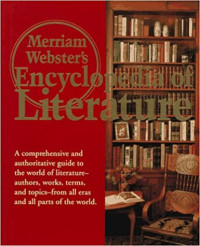Book
Merriam Webster's Encylopedia of Literature
A joint effort of editorial staffs from Merriam-Webster and Encyclopaedia Britannica, Merriam-Webster's Encyclopedia of Literature (MWEL) "contains entries for authors, works, literary landmarks, literary and critical terms, mythological and folkloric figures, fictional characters, literary movements and prizes, and other miscellaneous matters." The book is encyclopedic in coverage but very dictionary-like in its brevity of entries.
The more than 10,000 entries in this volume cover a vast amount of territory. There are biographical entries covering all nationalities and periods (Cavalcanti, Guido; Futabatei, Shimei; Joyce, James), brief entries on literary characters (Bovary, Emma; Hawkins, Jim), on specific works (Driving Miss Daisy; Lotus-Eaters, The), on forms of criticism (Feminist Criticism, New Criticism), on movements and events (Jindyworobak Movement, War of the Theaters), and on styles (Eclogue, Guwen). The only thing lacking is entries on the literary traditions of specific countries.
The average entry is well under 150 words, with the longest under 700 (Shakespeare, William, for example), and some as few as seven (Lineation is defined simply as "an arrangement of lines [as of verse]" ). Pronunciation is provided for most entries (even Miller, Daisy has one) and then an etymology for entries that define terminology. For biographical entries, places and dates of birth and death are given. The entry proper includes any cross-references ("used sparingly" according to the prefatory material) in small-capital letters. Titles of works are given in the original language followed by English translation. All entries are unsigned, and there are no bibliographies. Several hundred small black-and-white photographs and illustrations are provided.
By attempting to cover almost everything, some entries are almost uselessly brief (as in the Lineation example above). Others, though with a literary connection, almost seem lifted from a Merriam-Webster dictionary. Epigraph, for example, has two definitions, the first being "an inscription on a statue, a building, or a coin," and the second, "a quotation set at the beginning of a literary work." An oddity is the inconsistent description of living writers in both the present and past tense. The entry Drabble, Margaret, for example begins, "English writer of novels that are skillfully modulated variations on the theme of. . . ." Proulx, E. Annie, however, begins, "American writer whose darkly comic yet sad fiction was peopled with quirky, memorable characters." Nevertheless, MWEL admirably covers topics from a wide breadth of literary subjects. The volume also will serve as a valuable supplementary source for literary allusions, with such entries as Banshee, Jezebel, Kali, and a variety of other mythological and religious entries.
MWEL perhaps most closely represents the various Oxford Companion titles for depth of coverage, though even in that series one must first find the appropriate country-or genre-related volume. Any number of literary dictionaries and biographical dictionaries contain similar entries, but for sheer ready-reference capabilities, MWEL is in a class of its own. Its low price further justifies a place for this volume on any library's reference shelf.
Ketersediaan
Informasi Detail
- Judul Seri
-
-
- No. Panggil
-
-
- Penerbit
- Massachussetts : Merriam Webster\'s Incorporated., 1995
- Deskripsi Fisik
-
xii, 1236 p. : Illus. ; 26 cm
- Bahasa
-
English
- ISBN/ISSN
-
0877790426
- Klasifikasi
-
NONE
- Tipe Isi
-
-
- Tipe Media
-
-
- Tipe Pembawa
-
-
- Edisi
-
-
- Subjek
- Info Detail Spesifik
-
Ensiklopedi
- Pernyataan Tanggungjawab
-
-
Versi lain/terkait
Tidak tersedia versi lain
Lampiran Berkas
Komentar
Anda harus masuk sebelum memberikan komentar

 Karya Umum
Karya Umum  Filsafat
Filsafat  Agama
Agama  Ilmu-ilmu Sosial
Ilmu-ilmu Sosial  Bahasa
Bahasa  Ilmu-ilmu Murni
Ilmu-ilmu Murni  Ilmu-ilmu Terapan
Ilmu-ilmu Terapan  Kesenian, Hiburan, dan Olahraga
Kesenian, Hiburan, dan Olahraga  Kesusastraan
Kesusastraan  Geografi dan Sejarah
Geografi dan Sejarah